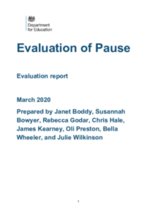This report presents findings from an evaluation of Pause, beginning in March 2018 and supported within Round 2 of the Department for Education’s Children’s Social Care Innovation Programme. The research was conducted in the context of growing concern about the risk of ‘subsequent removals’ of children from mothers who have had children removed into care, and the need to support this vulnerable population of women.
Pause as a national non-governmental organisation (NGO) supports local practices to deliver relationship-based support to women who have experienced removal of at least one child and are judged to be at risk of further removals of children. Established in 2013, Pause was funded to expand in Round 1 of the Innovation Programme, and Round 2 funding enabled further scale-up to 9 new areas in England and development of a pilot for young care-experienced women who have had one or more children removed. The Pause model of intensive trauma-informed relationship-based practice is delivered by practitioners over an 18 month period, and practitioners work flexibly according to women’s own perspectives and priorities. The Pause Framework (2017 p8) states that, ‘As a condition of beginning this voluntary programme, women agree to use the most effective reversible methods of contraception; […] Long Acting Reversible Contraception (LARC) so they have the opportunity to reflect and focus on their own needs, often for the first time in their lives.’
An independent evaluation, commissioned by the Department for Education and carried out by the University of Sussex in partnership with Research in Practice and Ipsos Mori, published in November 2020, found that the Pause Programme is effective in making a positive difference in women’s lives, improving their relationships with children, reducing rates of infant care entry in local areas and delivering cost savings for local areas. The evaluation interviewed 61 women, spoke to Pause Practices and local stakeholders and analysed Pause data.
The evaluation also identified the key ingredients in the Pause Programme which make the difference. They include:
- A holistic, trauma-informed, relationships-based approach
- Skilled Practitioners from a range of professional backgrounds
- Small caseloads enabling Practitioners to spend time with each woman
- Flexible financial resource for each woman
- Staffing continuity
- Flexibility and autonomy for Pause Practices

